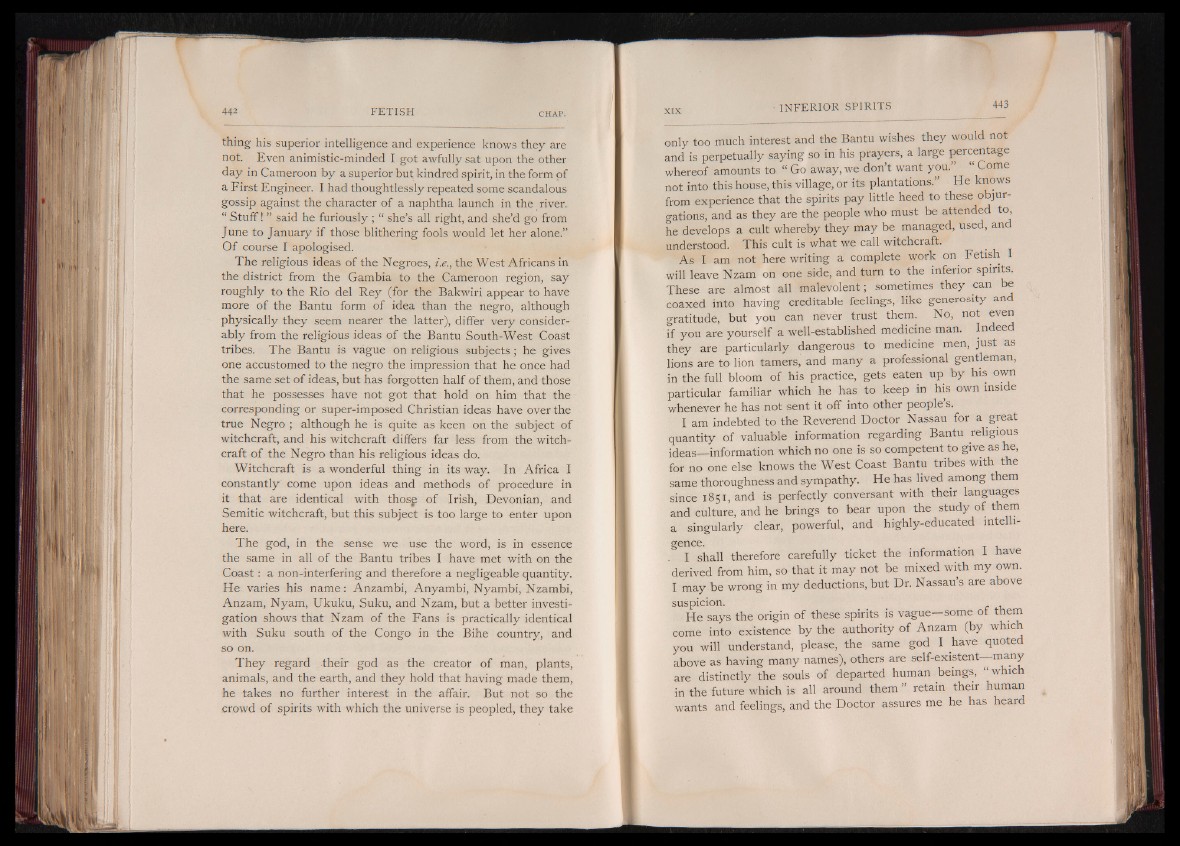
thing his superior intelligence and experience knows they are
not. Even animistic-minded I got awfully sat upon the other
day in Cameroon by a superior but. kindred spirit, in the form of
a First Engineer. I had thoughtlessly repeated some scandalous
gossip against the character of a naphtha launch in the river.
“ Stuff! ” said he furiously ; “ she’s all right, and she’d go from
June to January if those blithering fools would let her alone.”
Of course I apologised.
The religious ideas of the Negroes, i.e., the West Africans in
the district from the Gambia to the Cameroon region, say
roughly to the Rio del Rey (for the Bakwiri appear to have
more of the Bantu form of idea than the negro, although
physically they seem nearer the latter), differ very considerably
from the religious ideas of the Bantu South-West Coast
tribes. The Bantu is vague on religious subjects; he gives
one accustomed to the negro the impression that he once had
the same set of ideas, but has forgotten half of them, and those
that he possesses have not got that hold on him that the
corresponding or super-imposed Christian ideas have over the
true Negro ; although he is quite as keen on the subject of
witchcraft, and his witchcraft differs far less from the witchcraft
of the Negro than his religious ideas do.
Witchcraft is a wonderful thing in its way. In Africa I
constantly come upon ideas and methods of procedure in
it that are identical with thosf of Irish, Devonian, and
Semitic witchcraft, but this subject is too large to enter upon
here.
The god, in the sense we use the word, is in essence
the same in all of the Bantu tribes I have met with on the
Coast: a non-interfering and therefore a negligeable quantity.
He varies his name: Anzambi, Anyambi, Nyambi, Nzambi,
Anzam, Nyam, Ukuku, Suku, and Nzam, but a better investigation
shows that Nzam of the Fans is practically identical
with Suku south of the Congo in the Bihe country, and
so on.
They regard their god as the creator of man, plants,
animals, and the earth, and they hold that having made them,
he takes no further interest in the affair. But not so the
crowd of spirits with which the universe is peopled, they take
only too much interest and the Bantu wishes they would not
and is perpetually saying so in his prayers, a large percentage
whereof amounts to “ Go away, we don’t want you.” “ Come
not into this house, this village, or its plantations.” He knows
from experience that the spirits pay little heed to these objurgations,
and as they are the people who must be attended to,
he develops a cult whereby they may be managed, used, and
understood. This cult is what we call witchcraft.
As I am not here writing a complete work on Fetish I
will leave Nzam on one side, and turn to the inferior spirits.
These are almost all malevolent; sometimes they can be
coaxed into having creditable feelings, like generosity and
gratitude, but you can never trust them. No, not even
if you are yourself a well-established medicine man. Indeed
they are particularly dangerous to medicine men, just as
lions are to lion tamers, and many a professional gentleman,
in the full bloom of his practice, gets eaten up by his own
particular familiar which he has to keep in his own inside
whenever he has not sent it off into other people s.
I am indebted to the Reverend Doctor Nassau for a great
quantity of valuable information regarding Bantu religious
ideas— information which no one is so competent to give as he,
for no one else knows the West Coast Bantu tribes with the
same thoroughness and sympathy. He has lived among them
since 1851, and is perfectly conversant with their languages
and culture, and he brings to bear upon the study of them
a singularly clear, powerful, and highly-educated intelligence.
,
I shall therefore carefully ticket the information i have
derived from him, so that it may not be mixed with my own.
I may be wrong in my deductions, but Dr. Nassau’s are above
suspicion.
He says the origin of these spirits is vague— some of them
come into existence by the authority of Anzam (by which
you will understand, please, the same god I have quoted
above as having many names), others are self-existent— many
are distinctly the souls of departed human beings, w ic
in the future which is all around them ” retain their human
wants and feelings, and the Doctor assures me he has heard